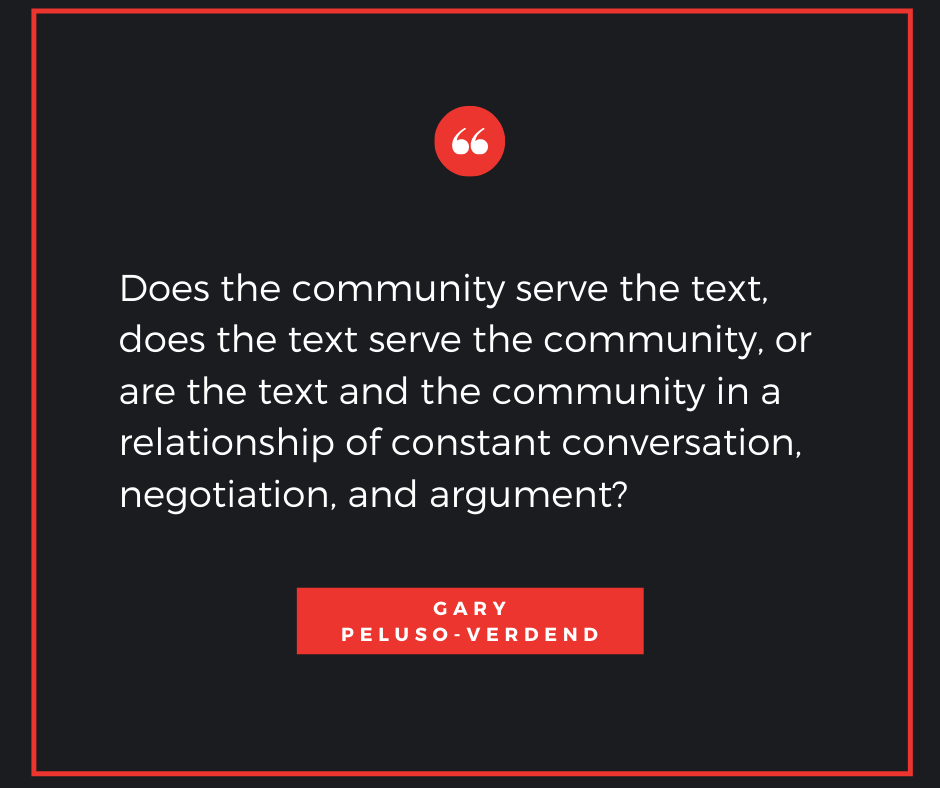Literalism, Originalism, and Dynamic Communities
Many of us in church circles hear those words and think, “Well, that perspective on the Constitution sounds a lot like how biblical literalists interpret the Bible.” Indeed, experts and interested others have noted and opined on this matter. And, it is not only observers who see connections. White evangelical, fundamentalist, and Catholic leaders have embraced originalism, allegedly as the perspective that would stop “judicial activism.” They see a connection between conservative religion and conservative judges.
Yes, there are similarities, as well as important differences. In the following, I quote extensively from a law journal article you can read here.
The authors summarize the similarities between originalism and literalism (emphasis added):
Literalism and originalism share a core commitment to the idea that their relevant texts have a timeless, fixed meaning that is readily ascertainable. In addition, both interpretive approaches are in significant part projects of restoration; both are deeply concerned about the loss of constraint that results from interpretation that is untethered to text; both have a strong, self-consciously populist impulse and an equally strong and self-conscious disdain for elite opinion, with respect to both interpretive norms and cultural values; and both maintain that all other approaches to their relevant texts are fundamentally illegitimate because they breach a duty of fidelity.
Here are two significant differences between biblical literalism and Constitutional originalism:
The Scope and Jurisdiction of the Text. The first fundamental difference between literalism and originalism derives from the starkly different nature, scope, and jurisdiction of their respective texts. Literalists believe that the Bible is truly universal. Originalists, by contrast, recognize that the Constitution is limited both in scope and ambition. It creates a legal structure and a government that is both geographically and jurisdictionally limited.
The Duty of the Interpreter. [T]he idea of submission in interpretation is central to both literalism and originalism. To both literalists and originalists, faithful interpretation requires the subordination of individual desires, interests, and even (at times) reason to the demands of the text. But the source and justification of the interpreter’s duty to submit are profoundly different in literalism and originalism. To the literalist, the duty to submit to the text arises both from the divine character of the text and the specific divine attributes of the text’s author. For most originalists, in contrast, the legal duty to submit to the text arises solely from the character of the document as an authoritative legal text.
The authors also cite many originalist comments regarding a judge’s duty to read the text plainly and without moral judgment; the important matter for a judge is not the rightness, goodness, morality, or justice of the text. The only matter is fidelity to the text. The authors think this a-moral approach should give literalists pause. However, as anyone who has argued with a literalist knows, the retort that “Hey, I’m not judging. God is judging, it is right here in the text,” certainly has affinities with the commitment that the text rules as God’s will, regardless of the interpreter’s moral judgments.
 As I read the article, I thought of one other angle on the relationship between literalism and originalism: what is the relationship between the text and the community? Does the community serve the text, does the text serve the community, or are the text and the community in a relationship of constant conversation, negotiation, and argument?
As I read the article, I thought of one other angle on the relationship between literalism and originalism: what is the relationship between the text and the community? Does the community serve the text, does the text serve the community, or are the text and the community in a relationship of constant conversation, negotiation, and argument?
For originalists and literalists, the logical answer would be that the community is constituted by and serves the text. Writing as an interpreter who is decidedly not a literalist, I do recognize there is truth in the claim. A community that uses a constituting text without norms or limits is simply looking for warrants for the actions they want to take.
However, it is essential to remember that the early Jesus movement produced the writings that centuries later became the Bible. Followers of Jesus wrote the Bible; the Bible did not create the church. Christian communities, and not the Bible, are the direct links to the first followers of Jesus. But, once the Bible was assembled, Christian communities have been in constant dialogue with it. There is now, or there should be, a reciprocal, symbiotic relationship between Bible and community.
It is also the case that “we the people” preceded the Constitution representatives of the people wrote. We the people desired and, one prays, desire to form a more perfect union. For that purpose, we enter a relationship with each other shaped, in part, by the Constitution. The people shape the Constitution, and the Constitution shapes the people.
The question of fidelity to a constituting text is always complicated by the text’s location: embedded in dynamic, evolving communities which have submitted themselves to an ongoing conversation and argument with their constituting texts. The texts as standalone documents are dead without communities that want to engage. And, once engaged, the meaning of the texts will be shaped and re-shaped, for texts in a dynamic community will be dynamic. Fixing the meaning for all time is neither possible nor desirable.
Dr. Gary Peluso-Verdend is president emeritus at Phillips Theological Seminary and is the executive director of the seminary’s Center for Religion in Public Life. The opinions expressed in this blog are those of the author. Learn more about the Center’s work here and about Gary here.


Comments are closed.